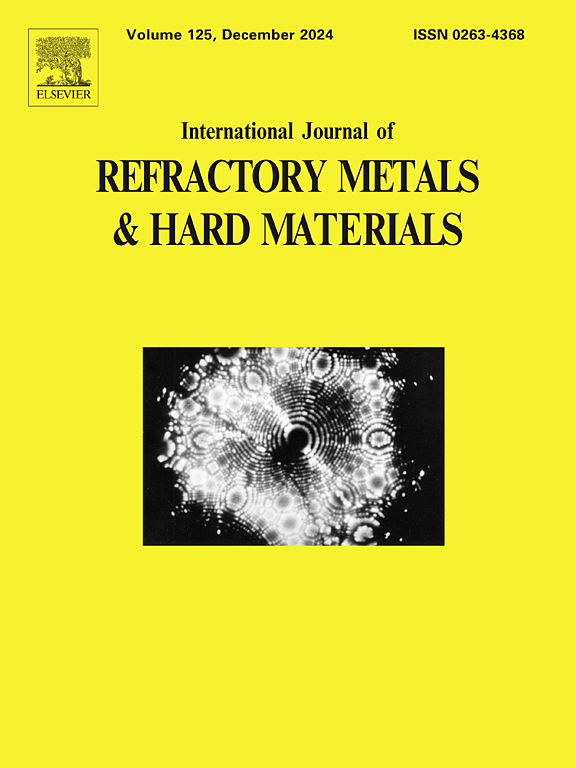A simple and effective strategy for WCu functionally graded materials with continuous gradient
IF 4.2
2区 材料科学
Q2 MATERIALS SCIENCE, MULTIDISCIPLINARY
International Journal of Refractory Metals & Hard Materials
Pub Date : 2024-11-30
DOI:10.1016/j.ijrmhm.2024.106974
引用次数: 0
Abstract
Functionally graded materials (FGM) have great potential in various applications, but require reliable and efficient manufacturing techniques. This study proposes a preparation strategy for W![]() Cu FGM with continuous gradient structure. The W green bodies with a continuously varying W content were prepared by using a self-designed mold to control compression deformation. Subsequently, two types of W
Cu FGM with continuous gradient structure. The W green bodies with a continuously varying W content were prepared by using a self-designed mold to control compression deformation. Subsequently, two types of W![]() Cu FGM samples were successfully fabricated through pre-sintering and infiltration processes. The W contents ranged from 64.8 wt% to 81.1 wt% and 75.3 wt% to 90.5 wt% respectively. The microstructure, density, Vickers hardness and electrical conductivity exhibited a continuous trend of change with the variation of W content. This gradient structure control method facilitated the efficient preparation of W
Cu FGM samples were successfully fabricated through pre-sintering and infiltration processes. The W contents ranged from 64.8 wt% to 81.1 wt% and 75.3 wt% to 90.5 wt% respectively. The microstructure, density, Vickers hardness and electrical conductivity exhibited a continuous trend of change with the variation of W content. This gradient structure control method facilitated the efficient preparation of W![]() Cu FGMs with continuously varying compositions. Moreover, it could be extended to achieve the continuous variation of composition and properties in other materials prepared via infiltration techniques.
Cu FGMs with continuously varying compositions. Moreover, it could be extended to achieve the continuous variation of composition and properties in other materials prepared via infiltration techniques.
求助全文
约1分钟内获得全文
求助全文
来源期刊
CiteScore
7.00
自引率
13.90%
发文量
236
审稿时长
35 days
期刊介绍:
The International Journal of Refractory Metals and Hard Materials (IJRMHM) publishes original research articles concerned with all aspects of refractory metals and hard materials. Refractory metals are defined as metals with melting points higher than 1800 °C. These are tungsten, molybdenum, chromium, tantalum, niobium, hafnium, and rhenium, as well as many compounds and alloys based thereupon. Hard materials that are included in the scope of this journal are defined as materials with hardness values higher than 1000 kg/mm2, primarily intended for applications as manufacturing tools or wear resistant components in mechanical systems. Thus they encompass carbides, nitrides and borides of metals, and related compounds. A special focus of this journal is put on the family of hardmetals, which is also known as cemented tungsten carbide, and cermets which are based on titanium carbide and carbonitrides with or without a metal binder. Ceramics and superhard materials including diamond and cubic boron nitride may also be accepted provided the subject material is presented as hard materials as defined above.

 求助内容:
求助内容: 应助结果提醒方式:
应助结果提醒方式:


